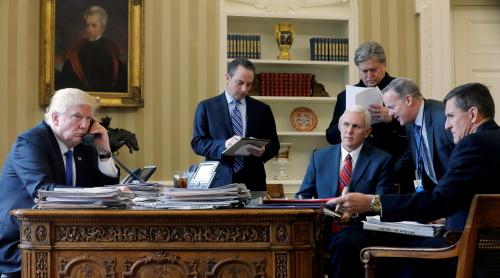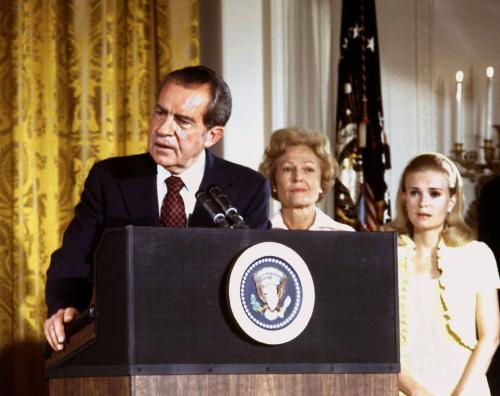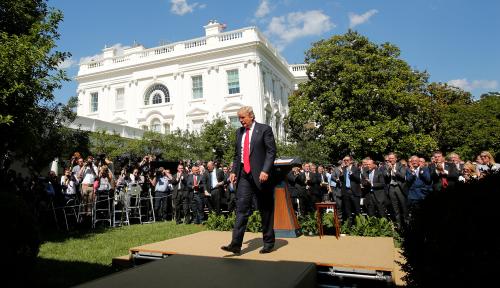Donald Trump is either the guiltiest president since Richard Nixon or the most incompetent president since the founding of the United States. Last night he fired the Director of the FBI, James Comey—the man in charge of investigating his White House and his campaign for links to Russia.
Comey’s sudden dismissal has set off a firestorm, not at all unlike the one forty-four years ago when President Nixon fired Archibald Cox. As Special Prosecutor, Cox was charged with investigating links between the Nixon White House, Nixon’s re-election campaign, and the break-in at the Democratic National Committee. Cox’s firing triggered the resignations of Attorney General Elliot Richardson and Deputy Attorney General William Ruckelshaus. The announcement came at 8:31 on Saturday night October 20, 1973—hence the “Saturday Night Massacre.” Cox had been in a pitched battle with the White House over the taping system in Nixon’s oval office. Eventually the tapes were handed over and proved that Nixon himself was part of the conspiracy targeting the Democratic National Committee. The smoking gun led Nixon to resign on August 8, 1974, just ahead of an impeachment vote.
Which brings us to the Tuesday night massacre of 2017. Over the past few weeks a federal prosecutor in Alexandria, Virginia has been issuing subpoenas to associates of Michael Flynn, Trump’s national security advisor who was fired because he lied about his ties to Russia. This marked a major turning point in an investigation that seems to be slowly but relentlessly marching towards campaign associates of President Trump. Firing the guy in charge of the investigation doesn’t help President Trump look innocent. The Justice Department rationale for the firing came in a memo from Rob Rosenstein, the Deputy Attorney General who was in only his fourteenth day on the job. The Rosenstein memo criticizes Comey for his behavior in the investigation into Hillary Clinton’s emails during the summer. And yet in the president’s letter firing Comey he makes no reference to the Hillary Clinton investigation which he so joyously hyped during his campaign. Instead he writes: “While I greatly appreciate your informing me on three different occasions that I am not under investigation, I nevertheless concur with the judgement of the Department…”
Democratic outrage was swift and immediate. Calls for a Special Prosecutor or a 9/11-style commission with subpoena power to investigate the whole Russia mess were to be expected from Democrats. But outrage was not reserved for Democrats alone. Senate Intelligence Chair Senator Richard Burr (R-NC), who supported Trump during the campaign, was “troubled.” As the night went on more Republicans joined Burr in questioning the President’s actions.
Get ready for a wild ride. In the next few days Congress will be called on to step up to its Constitutional duty to check presidential power. The days ahead will surely look like the days after the Saturday night massacre when the journalist Elizabeth Drew wrote:
“Beneath the suspense is the disturbing sense that people are not proceeding according to the processes. The President is circumventing the courts, and the senators are a party to his action. If the President succeeds in ridding himself of the Special Prosecutor, how can he, or any President, be held accountable.”[1]
Either Donald Trump is guilty and desperate to throw investigators off the trail, or he has just committed a monumental blunder. If he’s innocent he has made himself look guilty and by acting on impulse has shown his shallow knowledge of history, his lack of respect for the rule of law, and his monumental and ultimately self-destructive egotism. And if he’s guilty? Well we know how this story ends.
[1] Page 48 Washington Journal: The Events of 1973-1974 (New York: Random House, 1974)








Commentary
Trump fires Comey: Shades of Watergate
May 10, 2017